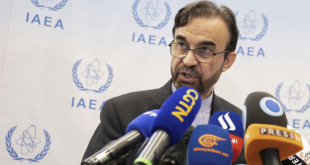 Iraq’s neighbors and other Arab countries gathered Saturday to discuss the future of the war-torn country — but the crisis involving Kurdish separatist rebels along the border between Iraq and Turkey threatened to overshadow the event.Â
Iraq’s neighbors and other Arab countries gathered Saturday to discuss the future of the war-torn country — but the crisis involving Kurdish separatist rebels along the border between Iraq and Turkey threatened to overshadow the event.Â
Secretary of State Condoleezza Rice was to meet with the foreign ministers of Turkey and Iraq to discuss joint cooperation between the three countries on preventing the Kurdish rebel group, Kurdistan Workers Party, or PKK, from launching attacks from Iraq into Turkey.Â
Rice met with Iraqi Prime Minister Nuri al-Maliki Friday, who pledged to work with Turkey in addressing the matter. State Department spokesman Sean McCormack said Rice and al-Maliki met with their aides for about an hour ahead of Saturday’s conference of Iraq’s neighbors and western powers in Istanbul.Â
Both leaders agreed in the brief meeting that the presence and activities of the PKK , were a “threat” to the Kurds, to Iraq and to Turkey, McCormack said. The Iraqi prime minister said both the Iraqi government and the Kurdish Regional Government would be involved in resolving the conflict with the PKK.Â
McCormack said Rice and al-Maliki both used the word “terrorist” to describe the organization.Â
The PKK has been launching attacks into southeastern Turkey in recent weeks, and some of the violence has spilled over into northern Iraq. The group is pushing for an autonomous Kurdish state in the region.Â
Turkey is threatening to launch a full-scale military attack against the PKK, and has massed 100,000 troops near the border. The United States fears strikes by its NATO ally against the PKK could destabilize the American-backed government in Baghdad and jeopardize supply lines for its 160,000-plus troops in Iraq.Â
Earlier Friday, senior State Department officials said the United States is offering Turkey a package of measures to dissuade it from launching a ground assault against the Kurdish rebels.Â
The officials told CNN that Rice met with Turkish officials in Ankara armed with a three-pronged approach, which included “concrete plans” to increase cooperation among the United States, Turkey and Iraq on the issue; support for limited Turkish action to punish the separatists and prevent further attacks; and a long-term strategy to dissolve the rebels’ group.Â
The U.S. proposals address demands by the Turkish government to reduce the PKK’s ability to conduct terror attacks, including limiting the movements of PKK fighters; stopping the flow of supplies and oil to the rebels; closing PKK offices in northern Iraq; and arresting those thought to be responsible for the recent attacks in Turkey, State Department officials said.Â
These are all steps the United States has been pressing the Kurdish government in northern Iraq to take.Â
In addition, the United States pledged to help increase cooperation among the United States, Turkey and Iraq, which was to be the topic of discussion at a three-way meeting between the countries at the neighbors conference. The Pentagon has confirmed it is already sharing intelligence with Turkey on PKK hideouts and movements.Â
Iraqi officials said they did not want the Turkish conflict with Kurdish rebels to be the centerpiece of the neighbors conference, rather they wanted to focus on their proposals for Iraq’s future, including security, energy and refugees.Â
The first neighbors conference in Sharm el-Sheikh, Egypt in May addressed Arab concerns about the al-Maliki government and its inability to foster political reconciliation among Iraqis Sunni, Shiia and Kurdish factions.Â
U.S. Ambassador to Iraq Ryan Crocker has been touring key Arab countries in the days before the Istanbul to urge them to engage with the Iraqi government and use influence with parties in Iraq to get behind the effort and support Iraq, senior State Department officials said.Â
“He is telling them the U.S. made an effort to stabilize Iraq with the surge and is getting ready to draw down, and won’t be there forever, so it is time for the Arabs to think about their long term interest in a stable Iraq. If they want to counter Iranian influence, they need to engage,” one aide to Crocker told CNN.Â
The official said that Crocker senses a keener interest and willingness of Sunni Arab states to help out in Iraq and open embassies in the Iraqi capital Baghdad.Â
Crocker has met with Iranian ambassador three times as part of working group with Iraq, to address Iranian behavior in Iraq, including U.S. charges it is supporting militants and arming insurgents with deadly explosives to kill U.S. soldiers.Â
Although no progress has been made in the meetings, officials say the channel is still open and the two are expected to meet again in the near future.Â
Rice is not expected to meet the foreign minister of Iran or Syria at the Istanbul conference, although they are both attending. At the May meeting Rice met with the Syrian foreign minister and had a brief exchange with the Iranian.Â
Rice will meet with the Saudi foreign minister in Istanbul and attend a ministerial meeting on Lebanon.
 Eurasia Press & News
Eurasia Press & News


